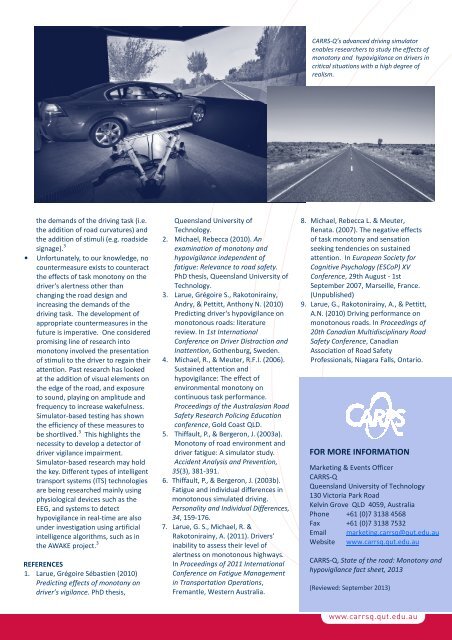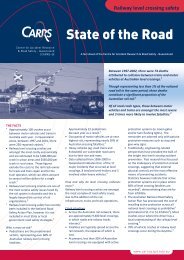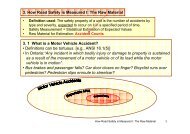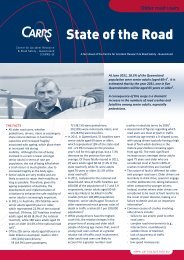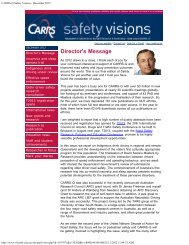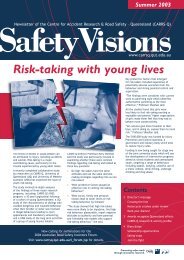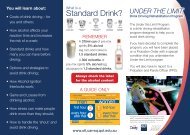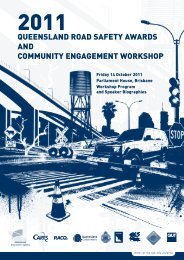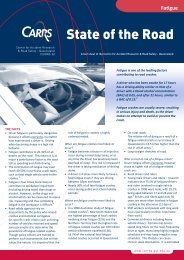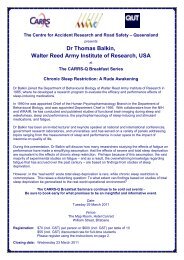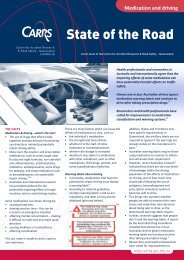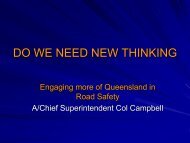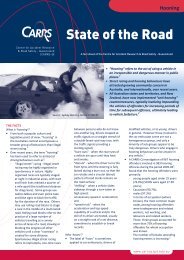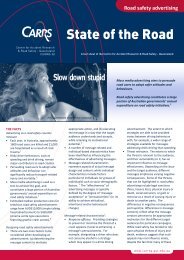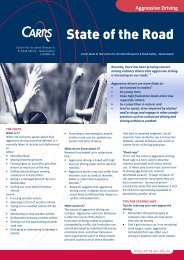Monotony and hypovigilance fact sheet - Centre for Accident ...
Monotony and hypovigilance fact sheet - Centre for Accident ...
Monotony and hypovigilance fact sheet - Centre for Accident ...
You also want an ePaper? Increase the reach of your titles
YUMPU automatically turns print PDFs into web optimized ePapers that Google loves.
CARRS-Q’s advanced driving simulator<br />
enables researchers to study the effects of<br />
monotony <strong>and</strong> <strong>hypovigilance</strong> on drivers in<br />
critical situations with a high degree of<br />
realism.<br />
the dem<strong>and</strong>s of the driving task (i.e.<br />
the addition of road curvatures) <strong>and</strong><br />
the addition of stimuli (e.g. roadside<br />
signage). 3<br />
• Un<strong>for</strong>tunately, to our knowledge, no<br />
countermeasure exists to counteract<br />
the effects of task monotony on the<br />
driver's alertness other than<br />
changing the road design <strong>and</strong><br />
increasing the dem<strong>and</strong>s of the<br />
driving task. The development of<br />
appropriate countermeasures in the<br />
future is imperative. One considered<br />
promising line of research into<br />
monotony involved the presentation<br />
of stimuli to the driver to regain their<br />
attention. Past research has looked<br />
at the addition of visual elements on<br />
the edge of the road, <strong>and</strong> exposure<br />
to sound, playing on amplitude <strong>and</strong><br />
frequency to increase wakefulness.<br />
Simulator-based testing has shown<br />
the efficiency of these measures to<br />
be shortlived. 3 This highlights the<br />
necessity to develop a detector of<br />
driver vigilance impairment.<br />
Simulator-based research may hold<br />
the key. Different types of intelligent<br />
transport systems (ITS) technologies<br />
are being researched mainly using<br />
physiological devices such as the<br />
EEG, <strong>and</strong> systems to detect<br />
<strong>hypovigilance</strong> in real-time are also<br />
under investigation using artificial<br />
intelligence algorithms, such as in<br />
the AWAKE project. 3<br />
REFERENCES<br />
1. Larue, Grégoire Sébastien (2010)<br />
Predicting effects of monotony on<br />
driver’s vigilance. PhD thesis,<br />
Queensl<strong>and</strong> University of<br />
Technology.<br />
2. Michael, Rebecca (2010). An<br />
examination of monotony <strong>and</strong><br />
<strong>hypovigilance</strong> independent of<br />
fatigue: Relevance to road safety.<br />
PhD thesis, Queensl<strong>and</strong> University of<br />
Technology.<br />
3. Larue, Grégoire S., Rakotonirainy,<br />
Andry, & Pettitt, Anthony N. (2010)<br />
Predicting driver's <strong>hypovigilance</strong> on<br />
monotonous roads: literature<br />
review. In 1st International<br />
Conference on Driver Distraction <strong>and</strong><br />
Inattention, Gothenburg, Sweden.<br />
4. Michael, R., & Meuter, R.F.I. (2006).<br />
Sustained attention <strong>and</strong><br />
<strong>hypovigilance</strong>: The effect of<br />
environmental monotony on<br />
continuous task per<strong>for</strong>mance.<br />
Proceedings of the Australasian Road<br />
Safety Research Policing Education<br />
conference, Gold Coast QLD.<br />
5. Thiffault, P., & Bergeron, J. (2003a).<br />
<strong>Monotony</strong> of road environment <strong>and</strong><br />
driver fatigue: A simulator study.<br />
<strong>Accident</strong> Analysis <strong>and</strong> Prevention,<br />
35(3), 381-391.<br />
6. Thiffault, P., & Bergeron, J. (2003b).<br />
Fatigue <strong>and</strong> individual differences in<br />
monotonous simulated driving.<br />
Personality <strong>and</strong> Individual Differences,<br />
34, 159-176.<br />
7. Larue, G. S., Michael, R. &<br />
Rakotonirainy, A. (2011). Drivers’<br />
inability to assess their level of<br />
alertness on monotonous highways.<br />
In Proceedings of 2011 International<br />
Conference on Fatigue Management<br />
in Transportation Operations,<br />
Fremantle, Western Australia.<br />
8. Michael, Rebecca L. & Meuter,<br />
Renata. (2007). The negative effects<br />
of task monotony <strong>and</strong> sensation<br />
seeking tendencies on sustained<br />
attention. In European Society <strong>for</strong><br />
Cognitive Psychology (ESCoP) XV<br />
Conference, 29th August - 1st<br />
September 2007, Marseille, France.<br />
(Unpublished)<br />
9. Larue, G., Rakotonirainy, A., & Pettitt,<br />
A.N. (2010) Driving per<strong>for</strong>mance on<br />
monotonous roads. In Proceedings of<br />
20th Canadian Multidisciplinary Road<br />
Safety Conference, Canadian<br />
Association of Road Safety<br />
Professionals, Niagara Falls, Ontario.<br />
FOR MORE INFORMATION<br />
Marketing & Events Officer<br />
CARRS-Q<br />
Queensl<strong>and</strong> University of Technology<br />
130 Victoria Park Road<br />
Kelvin Grove QLD 4059, Australia<br />
Phone +61 (0)7 3138 4568<br />
Fax +61 (0)7 3138 7532<br />
Email marketing.carrsq@qut.edu.au<br />
Website www.carrsq.qut.edu.au<br />
CARRS-Q, State of the road: <strong>Monotony</strong> <strong>and</strong><br />
<strong>hypovigilance</strong> <strong>fact</strong> <strong>sheet</strong>, 2013<br />
(Reviewed: September 2013)


